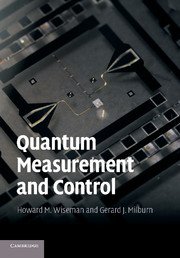Book contents
- Frontmatter
- Contents
- Preface
- 1 Quantum measurement theory
- 2 Quantum parameter estimation
- 3 Open quantum systems
- 4 Quantum trajectories
- 5 Quantum feedback control
- 6 State-based quantum feedback control
- 7 Applications to quantum information processing
- Appendix A Quantum mechanics and phase-space
- Appendix B Stochastic differential equations
- References
- Index
3 - Open quantum systems
Published online by Cambridge University Press: 17 February 2011
- Frontmatter
- Contents
- Preface
- 1 Quantum measurement theory
- 2 Quantum parameter estimation
- 3 Open quantum systems
- 4 Quantum trajectories
- 5 Quantum feedback control
- 6 State-based quantum feedback control
- 7 Applications to quantum information processing
- Appendix A Quantum mechanics and phase-space
- Appendix B Stochastic differential equations
- References
- Index
Summary
Introduction
As discussed in Chapter 1, to understand the general evolution, conditioned and unconditioned, of a quantum system, it is necessary to consider coupling it to a second quantum system. In the case in which the second system is much larger than the first, it is often referred to as a bath, reservoir or environment, and the first system is called an open system. The study of open quantum systems is important to quantum measurement for two reasons.
First, all real systems are open to some extent, and the larger a system is, the more important its coupling to its environment will be. For a macroscopic system, such coupling leads to very rapid decoherence. Roughly, this term means the irreversible loss of quantum coherence, that is the conversion of a quantum superposition into a classical mixture. This process is central to understanding the emergence of classical behaviour and ameliorating, if not solving, the so-called quantum measurement problem.
The second reason why open quantum systems are important is in the context of generalized quantum measurement theory as introduced in Chapter 1. Recall from there that, by coupling a quantum system to an ‘apparatus’ (a second quantum system) and then measuring the apparatus, a generalized measurement on the system is realized. For an open quantum system, the coupling to the environment is typically continuous (present at all times).
Information
- Type
- Chapter
- Information
- Quantum Measurement and Control , pp. 97 - 147Publisher: Cambridge University PressPrint publication year: 2009
Accessibility standard: Unknown
Why this information is here
This section outlines the accessibility features of this content - including support for screen readers, full keyboard navigation and high-contrast display options. This may not be relevant for you.Accessibility Information
- 1
- Cited by
